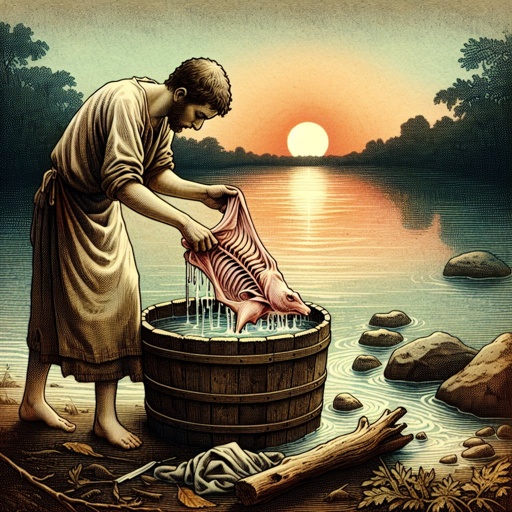What does Leviticus 25:43 mean?
"Thou shalt not rule over him with rigour; but shalt fear thy God." - Leviticus 25:43

Leviticus 25:43 - "Thou shalt not rule over him with rigour; but shalt fear thy God."
Leviticus 25:43 in the King James Version of the Bible reads, "Thou shalt not rule over him with rigour; but shalt fear thy God." This verse comes from the Old Testament book of Leviticus, which is understood to be a part of the Mosaic Law given to the Israelites by God through Moses. This verse is part of a larger section that outlines laws and regulations for the treatment of slaves and servants within the community.
In this particular verse, the focus is on the treatment of a fellow Israelite who has been reduced to servitude due to poverty or debt. The directive here is for the Israelites to refrain from ruling over their fellow countrymen with harshness or oppression, but instead to show them compassion and understanding. Additionally, it instructs them to fear God, implying that their treatment of others should be guided by a reverence for the moral and ethical standards set by God.
The themes present in this verse are justice, compassion, and reverence for God. The overarching theme of justice is evident in the emphasis on fair and humane treatment of those who have fallen into servitude. The commandment not to rule over them with rigour speaks to the importance of maintaining a just and equitable society, even in the context of servitude. This theme aligns with other biblical teachings that emphasize the fair and ethical treatment of others, regardless of their social or economic status.
Compassion is another significant theme in this verse. By instructing the Israelites to refrain from ruling over their fellow countrymen with rigour, the verse promotes a spirit of compassion and empathy. It emphasizes the importance of understanding the plight of those who have been forced into servitude and treating them with kindness and empathy. This aligns with the broader biblical message of loving one's neighbor and caring for the vulnerable and marginalized in society.
The theme of reverence for God is also prominent in this verse. The directive to fear thy God serves as a reminder that ethical behavior and treatment of others should be rooted in a deep reverence and respect for God. This theme underscores the idea that the Israelites' actions should be guided by a desire to honor God and uphold the moral principles set forth by Him.
The historical and cultural context of this verse is essential for understanding its significance. In the ancient world, slavery and servitude were common practices, and societies had varying attitudes and regulations regarding the treatment of slaves and servants. In this context, the laws outlined in Leviticus regarding the treatment of slaves and servants represented a significant departure from the prevalent practices of the time. By imposing limitations on the mistreatment of servants and emphasizing compassion and fairness, these laws reflected a radical and progressive approach to the treatment of those in servitude.
Furthermore, the endowment of ethical and moral principles for the treatment of slaves and servants demonstrated a commitment to establishing a just and humane society. This was a part of the broader mission of the Israelites to embody God's principles and serve as a light to other nations.
Symbolically, this verse serves as a reflection of the broader moral and ethical teachings found throughout the Bible. It underscores the significance of justice, compassion, and reverence for God in guiding human behavior and interactions. The directive not to rule over others with rigour serves as a reminder of the importance of fair and equitable treatment of all individuals, regardless of their social or economic status.
In conclusion, Leviticus 25:43 from the King James Version of the Bible conveys a profound message about justice, compassion, and reverence for God. It serves as a reminder of the ethical and moral principles that should guide human behavior, particularly in the treatment of those in vulnerable positions. This verse highlights the Israelites' commitment to establishing a just and equitable society and reflects the broader biblical message of love, mercy, and justice.
Leviticus 25:43 Artwork

Leviticus 25:43 - "Thou shalt not rule over him with rigour; but shalt fear thy God."

Genesis 43:25 - "And they made ready the present against Joseph came at noon: for they heard that they should eat bread there."

1 Samuel 25:43 - "David also took Ahinoam of Jezreel; and they were also both of them his wives."

Matthew 25:43 - "I was a stranger, and ye took me not in: naked, and ye clothed me not: sick, and in prison, and ye visited me not."

Leviticus 25:26 - "And if the man have none to redeem it, and himself be able to redeem it;"

Leviticus 25:34 - "But the field of the suburbs of their cities may not be sold; for it is their perpetual possession."

Leviticus 25:1 - "And the LORD spake unto Moses in mount Sinai, saying,"

Isaiah 43:25 - "I, even I, am he that blotteth out thy transgressions for mine own sake, and will not remember thy sins."

Leviticus 16:25 - "And the fat of the sin offering shall he burn upon the altar."

Leviticus 14:43 - "And if the plague come again, and break out in the house, after that he hath taken away the stones, and after he hath scraped the house, and after it is plaistered;"

Leviticus 25:24 - "And in all the land of your possession ye shall grant a redemption for the land."

Leviticus 13:43 - "Then the priest shall look upon it: and, behold, if the rising of the sore be white reddish in his bald head, or in his bald forehead, as the leprosy appeareth in the skin of the flesh;"

Leviticus 25:13 - "In the year of this jubile ye shall return every man unto his possession."

Leviticus 25:23 - "¶ The land shall not be sold for ever: for the land is mine; for ye are strangers and sojourners with me."

Leviticus 25:7 - "And for thy cattle, and for the beast that are in thy land, shall all the increase thereof be meat."

Leviticus 11:43 - "Ye shall not make yourselves abominable with any creeping thing that creepeth, neither shall ye make yourselves unclean with them, that ye should be defiled thereby."

Leviticus 23:43 - "That your generations may know that I made the children of Israel to dwell in booths, when I brought them out of the land of Egypt: I am the LORD your God."

Leviticus 25:32 - "Notwithstanding the cities of the Levites, and the houses of the cities of their possession, may the Levites redeem at any time."

Leviticus 27:25 - "And all thy estimations shall be according to the shekel of the sanctuary: twenty gerahs shall be the shekel."

Ezekiel 43:25 - "Seven days shalt thou prepare every day a goat for a sin offering: they shall also prepare a young bullock, and a ram out of the flock, without blemish."

Leviticus 25:12 - "For it is the jubile; it shall be holy unto you: ye shall eat the increase thereof out of the field."

Leviticus 25:40 - "But as an hired servant, and as a sojourner, he shall be with thee, and shall serve thee unto the year of jubile:"

Leviticus 25:25 - "¶ If thy brother be waxen poor, and hath sold away some of his possession, and if any of his kin come to redeem it, then shall he redeem that which his brother sold."

Leviticus 25:42 - "For they are my servants, which I brought forth out of the land of Egypt: they shall not be sold as bondmen."

Leviticus 11:25 - "And whosoever beareth ought of the carcase of them shall wash his clothes, and be unclean until the even."

Leviticus 25:48 - "After that he is sold he may be redeemed again; one of his brethren may redeem him:"

Leviticus 25:19 - "And the land shall yield her fruit, and ye shall eat your fill, and dwell therein in safety."

Leviticus 25:36 - "Take thou no usury of him, or increase: but fear thy God; that thy brother may live with thee."

Leviticus 25:37 - "Thou shalt not give him thy money upon usury, nor lend him thy victuals for increase."

Leviticus 23:25 - "Ye shall do no servile work therein: but ye shall offer an offering made by fire unto the LORD."